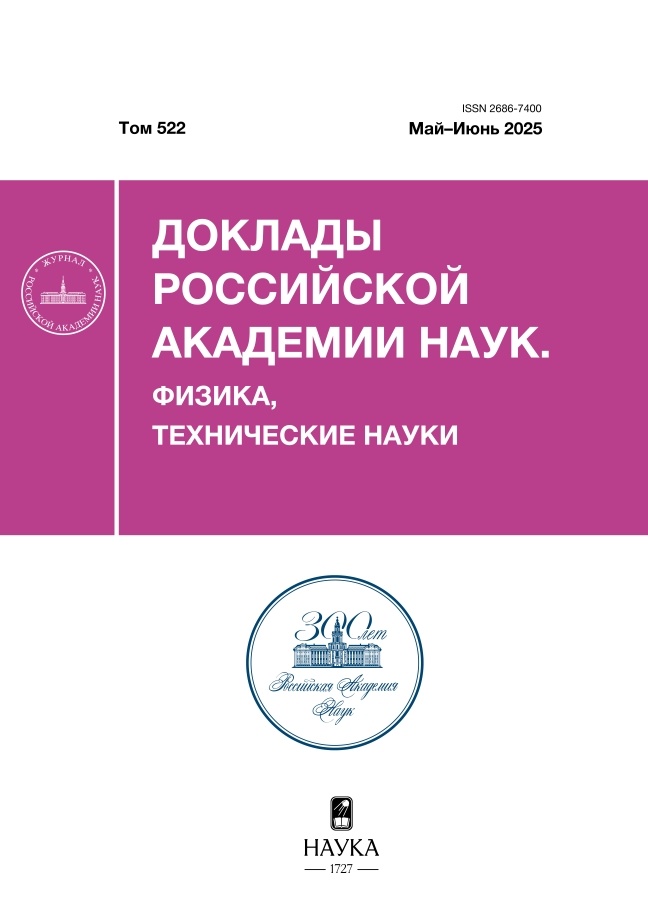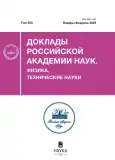Моделирование структурных элементов широкополосных низкочастотных шумопоглотителей для транспортной техники
- Авторы: Карпов Е.В.1,2, Говердовский В.Н.2, Бровкина Ю.И.2, Михайленко М.А.2,3, Горбунов Ф.К.3
-
Учреждения:
- Институт гидродинамики им. М.А. Лаврентьева Сибирского отделения Российской академии наук
- Московский политехнический университет
- Институт химии твердого тела и механохимии Сибирского отделения Российской академии наук
- Выпуск: Том 520, № 1 (2025)
- Страницы: 80-86
- Раздел: ТЕХНИЧЕСКИЕ НАУКИ
- URL: https://pediatria.orscience.ru/2686-7400/article/view/683279
- DOI: https://doi.org/10.31857/S2686740025010117
- EDN: https://elibrary.ru/GSZUUQ
- ID: 683279
Цитировать
Полный текст
Аннотация
Предложен подход, способный на 12-17 дБ и более повысить качество низкочастотного шумопоглощения внутри и вне транспортной техники. В рамках подхода рассматриваются вопросы проектирования композитов с полимерной матрицей и неорганической и/или биополимерной полидисперсной фазой, моделирования, измерения и анализа шумопоглощающих свойств тонких, одно-/двуслойных структурных элементов на основе новых композитов. Валидность подхода подтверждается корректностью применяемых физико-химических и измерительных методов, результатами экспериментального исследования тест-моделей композитов. Результаты могут быть использованы при совершенствовании и перспективном проектировании летательных аппаратов различного назначения, других видов транспортной техники.
Полный текст
Об авторах
Е. В. Карпов
Институт гидродинамики им. М.А. Лаврентьева Сибирского отделения Российской академии наук; Московский политехнический университет
Автор, ответственный за переписку.
Email: evkarpov@mail.ru
Член-корреспондент РАН
Россия, Новосибирск; МоскваВ. Н. Говердовский
Московский политехнический университет
Email: vng_scien@yahoo.com
Россия, Москва
Ю. И. Бровкина
Московский политехнический университет
Email: yulbrovkina@yandex.ru
Россия, Москва
М. А. Михайленко
Московский политехнический университет; Институт химии твердого тела и механохимии Сибирского отделения Российской академии наук
Email: mikhailenkoma79@gmail.com
Россия, Москва; Новосибирск
Ф. К. Горбунов
Институт химии твердого тела и механохимии Сибирского отделения Российской академии наук
Email: f.gorbunov@corp.nstu.ru
Россия, Новосибирск
Список литературы
- Environmental protection. ICAO Standards and Recommended Practices. V. 1. Aircraft noise. 2017.
- Шумовые характеристики пассажирских и грузовых самолетов. 2021. – https://eco-profi.info/index.php/akustika/akustika-samolet.html
- Мунин А.Г. Авиационная акустика. М.: Машиностроение, 1986.
- Шульдешов Е.М. Звукоизоляционные свойства авиационных теплозвукоизоляционных материалов // Труды ВИАМ. Полимерные материалы. 2019. Т. 12 (84). С. 37–45.
- Spakovszky Z.S. Advanced low-noise aircraft configurations and their assessment: past, present, and future // CEAS Aeronautical Journal. 2019. № 10. P. 137–157.
- Aerospace insulation materials. – Available: www.custommaterials.com.
- Tao Y., Ren M., Zhang H., Peijs T. Recent progress in acoustic materials and noise control strategies. A review // Applied Materialstoday. 2021. V. 24. 101141.
- Вешкин Е.А., Сатдинов Р.А., Баранников А.А. Современные материалы для салона самолета // Труды ВИАМ. Электронный научный журнал. 2021. https://dx.doi.org/10.18577/2307-6046-2021-0-9-33-42
- Huang S., Li Y., Zhu J., Tsai D.P. Sound-absorbing materials // Physical Review Applied. 2023. 20. 010501.
- Lee C.-M., Goverdovskiy V.N., Sukhinin S.V., Konstantinov A.P., Trilis A.V., Yurkovskiy V.S. Phonon crystals as elements of the broadband vibration and noise protection systems / Proc. International Forum on Strategy Technology (IFOST2017), Ulsan, Korea, 31 May-02 June, 2017.
- Барабанов В.Г., Биспен Т.А., Молдавский Д. Д. и др. / В кн. Физико-химические аспекты предельных состояний и структурных превращений в сплошных средах, материалах и технических системах, под ред. Ю. В. Петрова. 2-й вып. СПб: Политехника, 2018. С. 119–123, 138–144.
- Молдавский Д.Д., Говердовский В.Н., Биспен Т.А., Бардаханов С.П., Ли Ч.-М. Способ изготовления шумопоглощающего материала // Патент РФ № 2745020. Бюл. № 8. Опубл. 18.03.2021.
- Polyboyarov V.A., Gorbunov F.K., Voloskova E.V. Modification of the Rubberlike Polymers with the Nanodispersions. Lambert Academic Publishing (Hindawi), 2014.
- Scien Co., Ltd.: Methods and products. – Available: www.scien.co.kr.
- ISO 10534. Acoustics – Determination of sound absorption coefficient and impedance in impedance tubes.
- Lee C.-M., Xu Y. A modified transfer matrix method for prediction of transmission loss of multilayer acoustic materials // J. Sound and Vibration. 2009. V. 326. P. 290–301.
Дополнительные файлы












